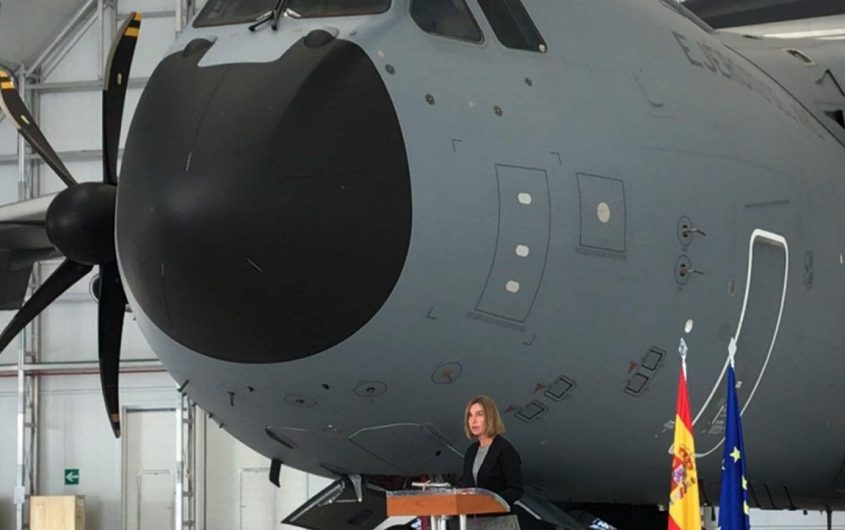
European External Action Service
How to Explain PESCO to Trump?

Niklas Helwig
Niklas Helwig was a DAAD/AICGS Research Fellow in October and November 2018. Prior to his research stay at the AICGS, he was a Transatlantic Post-Doc Fellow for International Relations and Security (TAPIR fellow). He was based at the RAND Corporation and the Center for Transatlantic Relations in DC, as well as at the German Institute for International and Security Affairs (SWP) in Berlin. Between 2014 and 2016. he worked as Senior Research Fellow at the Finnish Institute of International Affairs in Helsinki. Dr. Helwig was also a Visiting Researcher at the Centre for European Policy Studies in Brussels. He researched and taught at the University of Cologne and the University of Edinburgh, from where he received a double PhD (‘co-tutelle’). Dr. Helwig was a Marie Curie Early Stage Researcher in the Initial Training Network on EU external action (EXACT).
Dr. Helwig’s research interests include Germany’s foreign and security policy, European defense cooperation, transatlantic security cooperation, as well as the EU as a Global Actor. He wrote extensively for think tanks, online blogs, and academic journals, including European Foreign Affairs Review, The International Spectator, Internationale Politik und Gesellschaft, Huffington Post, EurActiv, and War on the Rocks.
During his time at the AICGS, Dr. Helwig analyzes U.S. domestic perception of the transatlantic alliance during the 2018 midterm elections. Lately, the U.S. administration emphasized a transactional perspective on the relationship with its allies. Historically, however, it can be argued that the transatlantic alliance was about more than economic prosperity and mutual defense, and instead based on a broader societal belief in shared values and identity. By analyzing the debates around midterm races across the U.S., the project aims to shed light on the question whether this notion still holds true in today’s America.
Additionally, he was a 2017-2018 participant in AICGS’ project “A German-American Dialogue of the Next Generation: Global Responsibility, Joint Engagement,” sponsored by the Transatlantik-Programm der Bundesrepublik Deutschland aus Mitteln des European Recovery Program (ERP) des Bundesministeriums für Wirtschaft und Energie (BMWi).
Who would have thought that the signing of a new framework for defense cooperation in the European Union is worthy of a push notification? Now political wonks on both sides of the Atlantic have to learn a new acronym: PESCO, short for Permanent Structured Cooperation.
How would you explain PESCO to Trump? At a high-level NATO conference the same day in Berlin, panelists visibly struggled to answer this question. Who can blame them? After European leaders announced at a summit in June 2017 to speed up the launch of PESCO, the EU consensus machine was on overdrive to produce a sophisticated compromise. While Germany wanted the pact to be appealing to a large number of states, other EU members like France and Finland were insisting on ambitious goals and value-added.
It is easier to describe the PESCO compromise by what it is not, rather than what it is. It is not a “European Army.” PESCO members will not transfer sovereignty to a supranational force structure. The development of nationally-owned defense capabilities is the focus. PESCO is also not a competitor to NATO. Of course, member states have an interest in using new capabilities in joint military operation. But they do not have plans to develop joint command structures or capabilities that could match the alliance, which remains the backbone of European security.
PESCO is also not the emergence of a “core Europe.” So far 23 of the 28 EU member states intend to join the new defense framework. Portugal and Ireland are likely to join by the end of the year, leaving only the UK (soon out), Denmark (opted out from EU defense), and non-aligned Malta on the sidelines. The PESCO members will participate in more concrete defense projects, called “modules.” These are yet to be presented, but might comprise joint drone programs or military officer training.
This ambition does not sound like a game changer, so why should Washington care? First, PESCO might ease the contentious debate on defense spending. For years U.S. administrations have been urging Europeans to spend more on defense. Especially President Trump has been very vocal about the failure of Germany and other European partners to meet the NATO target of spending 2 percent of GDP on defense. Instead of discussing meaningful ways to develop militaries in Europe, the debate among policymakers shifted toward the usefulness of the 2 percent benchmark and that its strict application would inflate Germany’s military budget.
PESCO shifts the focus back to a constructive discussion on how EU member states can make meaningful military contributions. Members signed up for a list of commitments that include the pledge to increase defense budgets in real terms, to collectively invest 20 percent of defense expenses in capabilities and to allocate 2 percent to defense research and technology. While these mirror previous commitments, PESCO introduces a binding process based on national implementation plans to assess member states’ progress in achieving these targets.
Second, PESCO is a useful European side-kick to NATO. EU ministers and officials do not get tired of pointing out that PESCO is complementary to the transatlantic military alliance. If implemented right, PESCO might actually help member states to be more capable NATO partners. Members of the PESCO club do not develop EU capabilities. Instead they can use their national means in the framework that they prefer or deem most useful for the given job, including the UN or NATO. For that to work efficiently, the EU and NATO have still to figure out how to sync their defense planning processes.
Third, the transatlantic partnership can benefit from a more unified European strategic outlook. European states in the south have a different threat perception than countries in the east. PESCO members will not converge their defense policies overnight. But it is a positive sign that Poland and the Baltic states joined PESCO. They are generally less enthusiastic about EU defense cooperation, do not want to compromise NATO’s role on the Eastern flank, and are eager to keep the U.S. engaged in Europe. Their decision to join shows that strong EU defense cooperation goes hand in hand with a commitment to the transatlantic partnership.
The verdict on PESCO is still out. When European heads of state and government formally launch PESCO in December, it will only be the start of a long and difficult process of assisting member states to build up national defense capabilities with a view to be less reliant on U.S. military support.
So, what if Trump asks about PESCO in the meantime? Tell him that PESCO is a kind of European real estate developer. Instead of hotels, PESCO is in the difficult business of developing national military capabilities.








